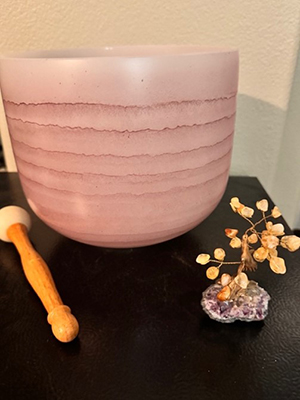Mindfulness Meditation
What is Mindfulness Meditation?

 Mindfulness meditation is a practice that involves focusing your attention on the present moment with an attitude of openness, curiosity, and non-judgment. It combines meditation with mindfulness principles, helping you cultivate awareness and acceptance of your thoughts, emotions, and bodily sensations.
Mindfulness meditation is a practice that involves focusing your attention on the present moment with an attitude of openness, curiosity, and non-judgment. It combines meditation with mindfulness principles, helping you cultivate awareness and acceptance of your thoughts, emotions, and bodily sensations.
 How It Works
How It Works
During mindfulness meditation, you typically:
- Find a Quiet Space – Sit comfortably in a calm environment.
- Focus on the Breath – Gently bring your attention to the natural rhythm of your breathing.
- Observe Thoughts and Emotions – Instead of getting caught up in them, simply notice them and let them pass like clouds in the sky.
- Return to the Present – If your mind wanders (which it will), gently bring your focus back to the breath or body sensations.
- Practice Non-Judgment – Accept whatever arises without labeling it as good or bad.
Benefits of Mindfulness Meditation
- Reduces stress and anxiety by calming the nervous system.
- Enhances focus and concentration by training the mind to stay present.
- Improves emotional regulation by increasing self-awareness.
- Promotes relaxation and better sleep by reducing overthinking.
- Boosts overall well-being by fostering a sense of inner peace and resilience.
 Different Ways to Practice
Different Ways to Practice
- Guided Meditations – Listening to recorded instructions.
- Silent Meditation – Practicing independently in a quiet space.
- Body Scan – Bringing awareness to different parts of the body.
- Walking or Moving Meditation – Mindfully observing each step and breath while walking.
Why Learn Mindfulness Meditation?
Mindfulness meditation offers profound benefits for the mind, body, and spirit, making it a valuable practice for anyone seeking greater well-being, clarity, and inner peace.
1. Reduces Stress & Anxiety
- Lowers cortisol levels (stress hormone).
- Helps manage worry and overthinking.
- Encourages relaxation and emotional resilience.
2. Improves Focus & Mental Clarity
- Strengthens attention span and concentration.
- Trains the brain to stay present rather than being distracted.
- Enhances decision-making and problem-solving skills.
3. Enhances Emotional Regulation
- Helps you respond rather than react to emotions.
- Reduces anger, frustration, and impulsivity.
- Encourages self-awareness and self-compassion.
4. Promotes Better Sleep
- Calms the mind, making it easier to fall and stay asleep.
- Reduces nighttime rumination and overactive thoughts.
- Encourages relaxation and deep rest.
5. Boosts Overall Well-Being
- Increases feelings of happiness and gratitude.
- Helps cultivate joy in everyday moments.
- Encourages self-acceptance and self-love.
6. Strengthens Relationships
- Improves communication and deep listening skills.
- Fosters patience, empathy, and kindness.
- Reduces reactivity in conflicts.
7. Supports Physical Health
- Lowers blood pressure and heart rate.
- Enhances immune system function.
- Helps manage chronic pain.
8. Encourages Mind-Body Connection
- Helps you tune into your body’s signals (hunger, tension, fatigue).
- Encourages a deeper connection with yourself.
- Cultivates inner peace and a sense of grounding.
9. Increases Resilience & Inner Strength
- Helps navigate challenges with greater ease.
- Cultivates acceptance and adaptability.
- Strengthens the ability to cope with uncertainty.
10. Fosters a Sense of Meaning & Purpose
- Encourages self-reflection and personal growth.
- Deepens spiritual awareness (if desired).
- Helps align your actions with your values.
Even 5-10 minutes a day can make a difference! Would you like help in getting started or finding a practice that fits your lifestyle?
Is It Difficult to Learn Mindfulness Meditation?
No, mindfulness meditation is not difficult, but like any skill, it requires practice and patience. The concept is simple: be present, observe your thoughts, and return to the moment without judgment. However, many people find it challenging at first because:
- The Mind Wanders Constantly – It’s natural for thoughts to drift. The key is to gently return to the present moment each time.
- Expectations Can Get in the Way – Many think they should “clear their mind,” but mindfulness isn’t about stopping thoughts; it’s about observing them without attachment.
- Discomfort with Stillness – If you’re used to being busy, sitting quietly can feel unfamiliar at first.
- Impatience for Results – The benefits build over time. Like exercising a muscle, mindfulness strengthens with consistent practice.
How to Make It Easier
- Start Small – Even 2-5 minutes a day is enough to begin.
- Use Guided Meditations – Apps like Insight Timer or Headspace can help.
- Focus on the Breath – Your breath is always with you, making it a simple anchor.
- Be Kind to Yourself – No one is perfect at meditation. Progress, not perfection, is the goal.
- Integrate It into Daily Life – Mindfulness isn’t just about sitting; you can practice while eating, walking, or even washing dishes.
Why Work with a Meditation Coach to Learn Mindfulness Meditation?
Learning mindfulness meditation can be transformative, but it’s not always easy to start or maintain on your own. A meditation coach provides guidance, structure, and support to help you build a sustainable and meaningful practice. Here’s why working with a coach can be beneficial:
1. Personalized Guidance for Your Needs
- A coach tailors mindfulness practices to suit your goals, lifestyle, and challenges (stress reduction, focus, emotional balance, etc.).
- They help you discover which techniques work best for you, whether it’s breath awareness, body scanning, or mindful movement.
- You receive real-time feedback to refine your practice.
2. Overcoming Common Challenges
- Mind constantly wandering? They teach how to gently refocus.
- Struggling with consistency? They create a structured plan.
- Feeling frustrated or impatient? They help you develop self-compassion and patience.
- Difficulty sitting still? They introduce movement-based mindfulness, like walking meditation.
3. Creating a Sustainable Routine
- A coach helps establish a realistic and achievable daily practice.
- They offer strategies to integrate mindfulness into daily activities, such as eating, walking, or working.
- You learn how to adapt mindfulness techniques to fit your personal and professional life.
4. Accountability & Motivation
- Having a coach keeps you committed—like a personal trainer for your mind.
- They help track progress, adjust techniques, and offer encouragement when challenges arise.
- You develop long-term habits rather than relying on occasional practice.
5. Deepening Your Practice
- A coach helps you move beyond surface-level mindfulness into deeper states of awareness and presence.
- They introduce advanced mindfulness techniques, such as loving-kindness meditation, breathwork, or guided visualizations.
- If you experience emotional resistance or challenges, they provide support and insight.
6. Emotional & Energetic Support
- Mindfulness can bring up deep emotions—a coach helps you navigate them with self-awareness and self-compassion.
- If you work with energy healing, movement, or expressive arts, a coach can help integrate mindfulness into your existing practices.
- They create a safe, supportive space for inner exploration and growth.
7. Making Mindfulness a Way of Life
- A coach teaches how to bring mindfulness beyond meditation—into daily interactions, decision-making, and overall well-being.
- You learn to cultivate presence, gratitude, and resilience in all aspects of life.
- They guide you in using mindfulness as a tool for self-discovery, healing, and transformation.
Is a Meditation Coach Right for You?
✅ If you’re new to mindfulness meditation and need expert guidance.
✅ If you’ve struggled with consistency or keeping a regular practice.
✅ If you want to deepen your practice and explore new techniques.
✅ If you’re looking for personalized support and accountability.
✅ If you want to incorporate mindfulness into your creative or healing work.
A meditation coach can help you cultivate mindfulness with ease and confidence, making the practice a natural part of your life.
